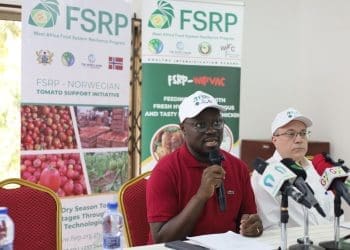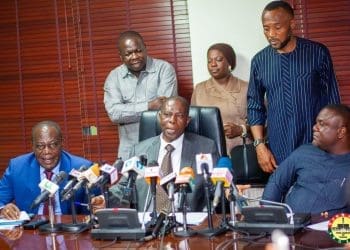The Deputy Chief of Staff, Nana Oye Bampoe Addo, has appealed to corporate entities, private organisations, and individuals to join the fight against the HIV and AIDS menace in Ghana by providing crucial financial support.
She made this call at the 14th National HIV/AIDS Partnership Forum held in Accra.
Miss Bampoe Addo, in her address, acknowledged a worrying trend of waning interest among donor partners in continuing to fund HIV/AIDS treatment across the continent.
This lack of sustained external aid is particularly evident in Ghana, where the shuttering of the United States Agency for International Development (USAID) operations has created a significant $78 million funding shortfall for HIV.
To mitigate this considerable gap, she stressed the need for private bodies and partners to step forward.
“Sustaining the gains made in the fight against HIV/AIDS requires a renewed focus on financing and sustainability,” she stated.
“Across Africa, funding for HIV treatment has plateaued. External aid is no longer a reliable solution for funding HIV across Africa,” she said, asserting that to truly end HIV as a public health threat, “we must reposition our national HIV response within a domestic financing framework.
A framework that reflects self-reliance
The Deputy Chief of Staff also outlined steps the government is taking to boost preventive healthcare and enhance early detection and disease management.
A key development is the launch of the Ghana Medical Trust (MahamaCares), initially intended to cover the cost of care and medication for persons living with non-communicable diseases.
The AIDS Commission and the United Nations AIDS have successfully engaged with the Trust to include HIV as one of the health conditions covered, marking a significant transition from donor-dependent HIV care to nationally anchored health solidarity.
Furthermore, she highlighted the uncapping of the National Health Insurance Levy, a measure aimed at releasing additional funds to support broader health coverage nationwide.
The government, she added, is also engaging with pharmaceutical companies to position Ghana as a hub for pharmaceutical production, building a foundation for the local manufacture of essential medicines, including supplies and funding for HIV treatment.
The Acting Director General of the Ghana AIDS Commission (GAC) Dr Kharmacelle Prosper Akanbong in his address made an urgent appeal to the partners in the fight to rid the country of HIV to strengthen domestic financing, support local production of essential commodities, advance legal and policy reforms to ensure services are accessed without fear, and intensify public education on safe behaviours and non-discrimination.
He stressed that only through this collective partnership—uniting government, communities, civil society, the private sector, and development partners—will Ghana achieve its ultimate ambition of reducing new HIV infections to zero and securing the health and rights of all citizens.
He stressed that only through this collective partnership – uniting government, communities, civil society, the private sector, and development partners – will Ghana achieve its goal of reducing new HIV infections to zero and securing the health and rights of all citizens.
Dr Akanbong noted that Wednesday’s meeting is no mere event, but a strategic platform for accountability, coherence and joint action.
He said, “Through our participation here, we align our efforts, ensure that actors speak to common national priorities, share data and experiences, mobilise resources and collaborate in the most efficient way possible.”
He concluded, “In an environment of constrained resources, such a partnership is not optional – it is essential if we are to optimise our impact, avoid duplication of effort and sustain the momentum required to meet our national ambitions.”
The Country Director of the Joint United Nations Programme on HIV/AIDS (UNAIDS), Hector Sucilla Perez, in a speech read on his behalf by the United Nations Educational, Scientific and Cultural Organisation (UNESCO) Country Representative, Edward Moukala N’Gouemo, stated that “donor priorities are shifting as governments confront multiple crises, from climate change and humanitarian emergencies to economic instability. Development assistance for health has stagnated or declined in many countries, and this reality compels us to look inward.”
He continued, “It is now more evident than ever that the sustainability of Ghana’s HIV response will depend on our ability to mobilise domestic resources, spend them strategically, and maintain partnerships that deliver value and results.”
While commending the government of Ghana for the measures it has taken so far, he also took the opportunity to remind it about the importance of how these resources are utilised.
He said, “Efficiency, transparency, and strategic allocation are essential. Every cedi spent should count-whether by reducing new infections, ensuring continuity of treatment, protecting vulnerable groups, or integrating HIV services within broader development efforts such as education, social protection, and workplace policies.”
Touching on the theme for the meeting – ‘harnessing domestic resources to end AIDS by 2030’, he reminded the gathering that “ government cannot do this alone.
Civil society, communities, and the private sector each have an indispensable role to play.
Through shared responsibility, innovation, and collaboration, we can mobilise resources, expand access, and ensure that no one is left behind.
Ending AIDS by 2030 is both an ambitious and achievable goal.
It will require sustained political will, smart financing, and inclusive partnerships that reflect the values of equity and dignity.”












